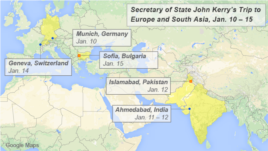The U.S. says that Pakistan is pledging a new willingness to attack Taliban and Haqqani Network insurgents in tribal areas along its Afghan border.
Senior U.S. State Department officials spelled out those intentions Monday night in Islamabad after Secretary of State John Kerry and other American diplomats had a working dinner with Pakistani Prime Minister Nawaz Sharif and some of his aides.
The U.S. envoys told reporters traveling with Kerry that the Pakistani officials said their forces would attack all Taliban militants in North Waziristan, and not attempt to "differentiate between good Taliban and bad Taliban."
The U.S. diplomats also said the Pakistanis indicated a willingness to fight the Haqqani Network, the Afghan insurgent organization encamped in the tribal area that has the backing of some Pakistani security officials.
Pakistani officials said the cost of fighting the insurgents in the tribal area has been significant, because of refugee-related issues and rebuilding efforts.
One top State Department official said the U.S. plans to send $250 million in new aid to Pakistan earmarked for reconstruction work in North Waziristan and Pakistan's federally controlled tribal areas, as well as to help Pakistanis who have been displaced elsewhere within the country.
Kerry's Pakistan visit comes less than a month after a Taliban assault on a Peshawar school killed 134 children and 16 staff members. A State Department official said Kerry's engagement with Pakistani officials is critical to advancing the "shared fight against militant extremism."
While in the country, Kerry is also convening the U.S.-Pakistan strategic dialogue, which last took place at ministerial level a year ago in Washington.
Continuation of the strategic dialogue with Pakistan is significant, says Atlantic Council analyst Bharath Gopalaswamy. He says it shows Pakistan is still high on the U.S. agenda, in spite of the U.S. troop drawdown in neighboring Afghanistan.
“One of the greatest concerns of Pakistani elites and Pakistani policy-makers has been that Pakistan will slip down the American agenda.”
Woodrow Wilson Center analyst Michael Kugelman says the drawdown in Afghanistan could have “troubling implications” for Pakistan.
“Let’s face it. There are going to be security vacuums in Afghanistan and there is likely to be more resurgent violence. This will spill over into Pakistan as the bordering country.”
Senior State Department officials say in addition to counterterrorism, Kerry and Pakistani officials are focusing on ways to increase trade and promote bilateral relations.
Woodrow Wilson Center analyst Michael Kugelman says the drawdown in Afghanistan could have “troubling implications” for Pakistan.
“Let’s face it. There are going to be security vacuums in Afghanistan and there is likely to be more resurgent violence. This will spill over into Pakistan as the bordering country.”
Senior State Department officials say in addition to counterterrorism, Kerry and Pakistani officials are focusing on ways to increase trade and promote bilateral relations.
Kerry's nearly week-long trip includes stops in Europe, but his visit to Pakistan had not been publicly announced.
He will also stop in France to show U.S. solidarity after last week's terror attacks in Paris, following criticism about the lack of a high-level Obama administration official at Sunday's massive unity march in Paris.
Kerry's travels will also take him to Geneva, where he will discuss Iran's nuclear program with Iranian Foreign Minister Mohammad Javad Zarif on Wednesday. The meeting comes ahead of the next round of nuclear talks beginning there on Thursday.
From Geneva, the top U.S. diplomat travels on to Bulgaria for talks on issues that include security cooperation and bilateral trade.
The India leg of the trip focused on increased trade between the U.S. and India, and to lay the groundwork for an Indian visit by President Barack Obama later this month.

No comments:
Post a Comment